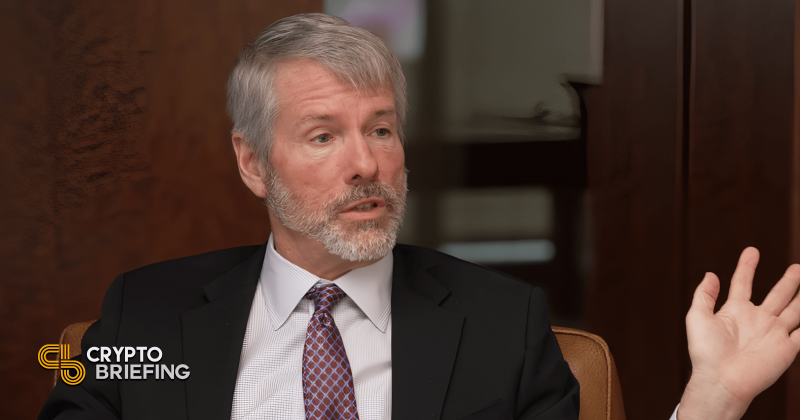Key Takeaways:
I. Saylor's extensive Bitcoin holdings create a potential conflict of interest, necessitating transparent disclosure and careful consideration of his policy recommendations.
II. Trump's pro-Bitcoin stance, amplified by Saylor's influence, could lead to both market booms and increased volatility, requiring a balanced regulatory approach.
III. The intersection of AI and cryptocurrency, overseen by David Sacks, adds another layer of complexity, demanding a regulatory framework that addresses both technological advancement and potential ethical concerns.
Michael Saylor, the Bitcoin-obsessed CEO of MicroStrategy, has publicly expressed his willingness to advise Donald Trump on cryptocurrency matters if called upon. With MicroStrategy holding a staggering 439,000 Bitcoins, worth roughly $45.6 billion as of late 2024, Saylor's potential influence on a second Trump administration's crypto policy is substantial. This article analyzes the multifaceted implications of such an advisory role, exploring the potential impacts on Bitcoin regulation, market dynamics, and the broader digital asset landscape. Given Trump's previously stated pro-Bitcoin stance, including proposals for a strategic Bitcoin reserve and a crypto advisory council, Saylor's involvement could significantly shape the future of cryptocurrency in the United States.
Navigating the Bitcoin Gambit: Saylor's Influence on US Crypto Policy Under Trump
Michael Saylor's influence stems not only from his leadership at MicroStrategy but also from the company's extraordinary Bitcoin holdings. As of Q4 2024, MicroStrategy possesses 439,000 BTC, a stake currently valued at approximately $45.6 billion. This represents a significant portion of the circulating Bitcoin supply, giving Saylor an unparalleled vested interest in the cryptocurrency's success. His advocacy for Bitcoin as a primary store of value and a hedge against inflation aligns directly with MicroStrategy's investment strategy.
This substantial Bitcoin position creates a potential conflict of interest should Saylor advise Trump on crypto policy. Regulations favoring Bitcoin, such as tax breaks for long-term holders or the establishment of a Bitcoin-based financial instrument, could directly benefit MicroStrategy, potentially influencing Saylor's recommendations. This raises concerns about regulatory capture, where policy decisions serve private interests rather than the broader market.
To mitigate these concerns, transparency is paramount. Saylor's financial stake in Bitcoin must be fully disclosed and any policy recommendations he makes should be subject to rigorous public scrutiny. Independent expert analysis and open debate are crucial to ensure that policy decisions are driven by market needs and not unduly influenced by individual actors.
Furthermore, a diverse crypto advisory council, composed of experts with varying perspectives and minimal conflicts of interest, is essential to counterbalance Saylor's influence and ensure a more holistic approach to crypto regulation. This would foster a more balanced and sustainable regulatory framework that benefits the entire ecosystem, not just individual players.
Bitcoin Under Trump: Navigating the Regulatory Landscape
Donald Trump's pro-Bitcoin stance, including his interest in a strategic Bitcoin reserve, creates both opportunities and challenges for the crypto market. His past statements and actions, such as the appointment of pro-crypto figures like David Sacks, suggest a potentially favorable regulatory environment for Bitcoin under a second Trump administration. This could further fuel institutional adoption and drive market growth, potentially pushing Bitcoin's price to new highs.
However, Trump's policies also carry the risk of increased market volatility. The crypto market, known for its price swings, could become even more susceptible to fluctuations driven by political pronouncements and regulatory uncertainty. A sudden shift in policy or a negative statement from the administration could trigger a significant market correction, impacting both retail and institutional investors.
The potential shift in regulatory oversight from the SEC to the CFTC presents another layer of complexity. While the CFTC's commodity-focused approach might be seen as more permissive for Bitcoin, it could also create regulatory arbitrage opportunities and leave gaps in consumer protection. A clear and consistent regulatory framework, regardless of which agency takes the lead, is essential for long-term market stability and investor confidence.
Furthermore, the creation of a strategic Bitcoin reserve raises questions about its potential impact on the US dollar and the global financial system. The scale and management of such a reserve could influence Bitcoin's price, potentially creating artificial scarcity or exacerbating existing volatility. International coordination and careful consideration of the macroeconomic implications are crucial to avoid unintended consequences.
The Algorithmic Regulator: Sacks, AI, and the Future of Crypto
David Sacks's appointment as AI and cryptocurrency czar introduces a crucial variable into the equation. His background as PayPal's COO provides valuable experience in fintech and his understanding of technology suggests a forward-thinking approach to regulation. However, his specific views on cryptocurrency and its intersection with AI remain relatively opaque, creating uncertainty about his regulatory priorities.
This dual mandate over AI and cryptocurrency highlights the increasing convergence of these two transformative technologies. AI's potential applications in the crypto space, such as fraud detection, algorithmic trading, and smart contract execution, present both opportunities and risks. Sacks's challenge lies in developing a regulatory framework that fosters innovation while mitigating potential harms, including AI-driven market manipulation, algorithmic bias, and data privacy violations. This requires a deep understanding of both technologies and a commitment to ethical considerations in their application.
The Future of Crypto: Balancing Innovation, Regulation, and Market Integrity
The convergence of Saylor's potential influence, Trump's pro-Bitcoin stance, and Sacks's oversight of AI and cryptocurrency marks a critical juncture for the digital asset ecosystem. Navigating this complex landscape requires a balanced approach that fosters innovation while mitigating risks. Transparency, public discourse, and international collaboration are essential to ensure that policy decisions serve the long-term interests of the market and not just the interests of individual players. The future of crypto hinges on striking this delicate balance, creating a regulatory environment that promotes responsible innovation, protects investors, and fosters a sustainable and inclusive digital financial future.
----------
Further Reads
I. MicroStrategy CEO Saylor: Logical thing for U.S. is to buy Bitcoin and own the future - YouTube
II. Michael Saylor Loses MicroStrategy Voting Control Amid Soaring BTC Adoption
III. Congress blocked SEC guidance on crypto as industry lobbying surged - OpenSecrets News

